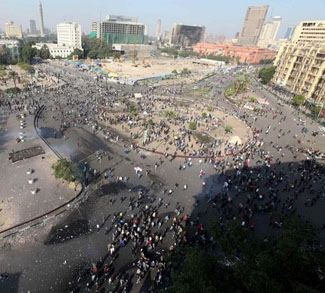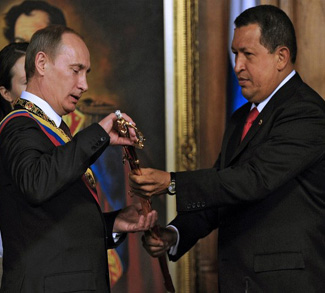Did Egypt’s revolution even succeed, or was everyone a little too eager to accept the comfortable story book ending of a media narrative?
Tahir Square is once again awash in blood and tear gas, and it’s going to get a lot worse before it gets any better. In fact, it’s already starting to look a lot like it did in January and February of last year. After three days of renewed protesting, 20 people have been killed, some reportedly at the hands of government troops using live ammunition. Reports are also suggesting that the military council has been sending out plain clothes agents to incite protestors, providing an excuse to use heavy-handed tactics to clear the square.
As of Monday, the Egyptian people don’t seem to be very intimidated. Every attempt by government forces to clear the Tahir Square has backfired. Protestors simply leave temporarily only to come back later and re-occupy the square in ever-increasing numbers. Many of them are demanding that the ruling military council dissolve immediately and hand power to the Egyptian parliament that will be formed by elections next week.
Protestors are angry at the slow pace of change since President Mubarak was ousted earlier this year, and given the paltry amount of reform that has taken place since then- this isn’t too surprising. The country is still run by the military. More specifically, it’s still run by Mohammed Hussein Tantawi, a close former ally of Hosni Mubarak who has served as the Minister of Defense since 1991. This begs the question: what has changed in Egypt?
Egypt’s protestors never really got what they were asking for; they simply shelved their demands after Hosni Mubarak stepped down in February of this year. They did so in the hope that the Egyptian Army would keep to its promises and institute swift and far-reaching political and economic reforms. The army of course had earned these ten months of relative inscrutability because of its original decision not to get violent with protestors back in January. But it looks like their grace period is over.
Judging from its record up until now, the ruling military council has not proved itself to be either a savvy political operator or a diehard adherent to Western liberalism. In fact, most of its moves have come off as clumsy and amateurish. The draft constitution that it presented the Egyptian people earlier this month cast the military as the guardian of ‘constitutional legitimacy,’ a supra-civilian entity keeping its paternal eye on workings of Egyptian democracy. Of course, this role would place the military’s budget and leadership outside the area of concern of any civilian government. Not surprisingly, the Egyptian people didn’t buy it. They took to the streets instead.
The military council may have even gotten away with this kind of constitutional pocket-stuffing given prevailing exhaustion as well as the genuine desire of Egyptians to start re-building their country’s image and stability. But the ruling military council has also been dragging its feet on presidential elections, elections they say won’t be held until late 2012 or even 2013. This wasn’t acceptable to the few, and now that protestors have once again been shot in Tahir Square– it has become unacceptable to the many.
Now the revolution will enter its second phase, and all of the question marks that existed beforehand are still in play. The ruling council, liberals, and Islamists will all be trying to maximize their positions in whatever new order is established. If things get out of hand, the Egyptian Army may reach for a new halo and this time cast itself as the ‘guardian of Egyptian stability.’ The only thing that’s certain is that no one knows who will come out on top.
The Egyptian Revolution is right back where it started.




